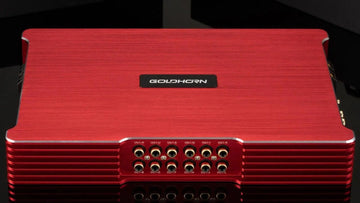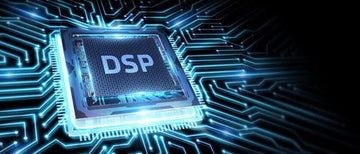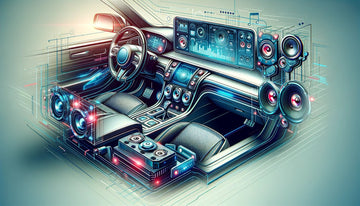Digital signal processing (DSP) has become an integral part of our everyday lives, from audio and video processing to wireless communication and control systems. It is a field that involves the mathematical manipulation of digital signals, allowing advanced signal processing techniques to be applied to various applications. In this blog, we will explore the critical components of digital signal processing systems, the different types of signal processors, how they improve audio quality, factors to consider when selecting a suitable digital signal processor, and whether high-priced processors are worth the investment.
New to DSP in car audio? Start your journey with our beginner-friendly guide. Learn the basics in Discover the World of Car Audio DSP.
Understanding Digital Signal Processing

Digital signal processing, or DSP, is the mathematical manipulation of digital signals for various processing tasks. DSP algorithms analyze, modify, and control digital data, allowing for filtering, compressing, or encrypting digital signals. It is a crucial technology for audio, video, wireless communication, and control systems, as it enables high-quality processing, real-time processing, and advanced signal processing techniques.
What is Digital Signal Processing?
Digital signal processing involves processing digital data, represented as discrete values, using mathematical operations. DSP algorithms analyze digital signals to extract information, modify them for specific purposes, or control their behavior. By performing high-speed calculations, digital signal processors can manipulate digital signals in real-time, enabling various applications.
The Importance of DSP
The importance of digital signal processing cannot be overstated, as it plays a crucial role in various domains. DSP enables high-quality audio and video processing for multimedia applications, enhancing signal quality, reducing noise, and improving the signal-to-noise ratio. Real-time processing allows for interactive and responsive systems, while advanced signal processing techniques enable diverse applications in audio, wireless communication, and image processing technologies.
Critical Components of a Digital Signal Processing Interface
A digital signal processing system consists of several vital components that work together to process digital signals effectively. These components include analog-to-digital converters, digital filters, digital-to-analog converters, and signal processors.
Analog-to-Digital Converters
Analog-to-digital converters, or ADCs, are essential to digital signal processing systems. They sample and quantify analog signals, converting them into digital signal values for processing. ADCs provide an accurate representation of analog signals, and their resolution and sampling rate determine the quality of digital signal processing. They are crucial for digital audio, video, wireless, and control systems, enabling the conversion of continuous voltage signals into digital form.
Digital Filters
Digital filters are another critical component of digital signal processing systems. They process digital signals for various purposes, such as noise reduction, equalization, and control. There are two main types of digital filters: finite impulse response (FIR) filters and infinite impulse response (IIR) filters. FIR filters use a finite impulse response for signal processing, while IIR filters use an infinite impulse response. Digital filters can be designed for low-pass, high-pass, band-pass, or notch filtering, and they find applications in audio equalization, image processing, and wireless communication, among others.
Digital-to-Analog Converters
Digital-to-analog converters, or DACs, play a crucial role in digital signal processing systems by converting digital signals back into analog for output. DACs reconstruct digital signal values into continuous voltage signals, providing an accurate representation of digital signals. Output filters are used to smooth the reconstructed signal for output. DACs are essential for digital audio, video, control, and wireless systems, enabling the conversion of digital signals into analog form for audio output.
Signal Processors
Signal processors are specialized components implementing digital signal processing algorithms for specific applications. They perform high-speed calculations for signal processing tasks, processing digital signal input from analog-to-digital converters and outputting digital signals for digital-to-analog converters. Signal processors typically have multiple input and output channels, allowing for processing of multiple signals simultaneously. They find applications in audio processing, wireless communication, control systems, and more, offering features like equalization, crossover, sound enhancement, and other signal processing capabilities.
Different Types of Signal Processors

Signal processors can be classified into different types based on their specific signal-processing capabilities. Two common types of signal processors are equalizers and crossovers, which play a significant role in audio processing for car audio systems, home audio systems, and professional audio setups.
Equalizers
Equalizers are signal processors that adjust the frequency response of audio signals, allowing for control over audio levels for different frequency bands. Graphic equalizers, for example, allow for adjustments to audio levels across multiple frequency bands, while parametric equalizers provide more precise control over audio frequencies. Equalizers are used for audio system tuning, sound reinforcement, recording studios, and more. Digital equalizers offer advanced features, remote control, preset settings, and other enhancements for audio processing. Additionally, some digital equalizers also include a line driver, such as the RFPEQU universal Punch EQ mentioned earlier, which allows the signal to connect to the audio system with greater strength and clarity.
Crossovers
Crossovers are signal processors that improve audio quality by separating sound frequencies for clarity and reproduction. By directing bass, midrange, and treble frequencies to the appropriate speakers, crossovers prevent distortion and optimize sound output for different speakers. Digital signal processors with crossover filters, such as the db Crossover function, offer precise control over crossover points, enabling customized sound tuning for car audio systems, home audio systems, and other audio setups.
How Signal Processors Improve Audio Quality

Signal processors play a crucial role in improving audio quality through various techniques such as noise reduction and sound enhancements.
Noise Reduction Techniques
Digital signal processors employ advanced noise reduction techniques to minimize audio disturbances for more precise audio output. These techniques can include algorithms that minimize background hiss, hum, and other audio anomalies, ensuring a clean audio signal free from interference. With digital sound processing, signal processors eliminate unwanted audio artifacts, resulting in a more enjoyable listening experience.
Enhancements in Sound Quality
Signal processors offer various sound enhancements, such as bass boost, treble boost, soundstage widening, and audio dynamics control, to improve sound quality. Advanced equalization features allow for precise sound tuning, matching personal preferences or audio system requirements. Digital sound processing technology enhances audio resolution, producing detailed and lifelike sound reproduction. By optimizing audio output for different speakers, signal processors ensure a balanced and immersive sound quality for car audio systems, home audio systems, and more.
Selecting the Right Digital Signal Processor for Your Needs

When selecting a digital signal processor, it is essential to consider various factors to ensure compatibility with your audio system and meet your specific requirements.
Factors to Consider When Buying a Digital Signal Processor
Consider the input and output channels of a digital sound processor, ensuring compatibility with your audio system setup. Look for signal processors that offer OEM integration, allowing for seamless integration with your car's audio system or other audio setups. Choose a digital sound processor with a user-friendly interface, control options, and remote control for easy customization. Consider signal processors with wireless connectivity, app control, and other convenient features for versatile operation. Prioritize signal processors with quality audio processing capabilities, signal-to-noise ratio, and output quality for the best sound output.
Are High-Priced Digital Signal Processors Worth the Investment?
High-priced digital signal processors often offer advanced features, superior audio processing, and better sound quality. Investing in a high-quality signal processor can enhance your audio system for a more enjoyable listening experience, providing sound clarity, soundstage, and audio dynamics control. High-priced digital signal processors may also come with additional accessories, warranty, and customer support, providing peace of mind for audio enthusiasts. However, it is essential to consider your audio system setup, personal preferences, and budget when deciding if a high-priced signal processor is worth the investment, balancing your audio system's needs, desired sound quality, and budget for an informed decision.
Frequently Asked Questions
What is the difference between a finite impulse response filter and an infinite impulse response filter?

Finite impulse response (FIR) filters have a finite duration and produce outputs based on weighted sums of input signals and past inputs. On the other hand, infinite impulse response (IIR) filters have an infinite duration and produce outputs based on weighted sums of input signals, past inputs, and past outputs. FIR filters are more stable with linear phase responses, while IIR filters can have nonlinear phase responses and may be unstable in some instances. The choice between FIR and IIR filters depends on specific application requirements like passband ripple, stopband attenuation, and group delay.
What is the role of an analog-to-digital converter in digital signal processing?
The analog-to-digital converter (ADC) plays a crucial role in digital signal processing by converting analog signals into digital ones. Digital signal processing heavily relies on these converted signals for analysis and manipulation. ADCs find applications in various fields, including audio recording and medical imaging, where the converter's accuracy impacts the quality of the digital signal and the results of digital signal processing.
Conclusion

To summarize, digital signal processing is a crucial aspect of audio quality enhancement. Understanding the components' role in the system is essential for selecting a suitable processor. Factors such as noise reduction techniques and enhancements in sound quality contribute to a superior audio experience.
While high-priced processors may offer advanced features, it's essential to consider your specific requirements before investing. Overall, digital signal processing plays a vital role in improving the quality of audio signals, making it an indispensable technology in various industries.
To delve deeper into DSP topics:





